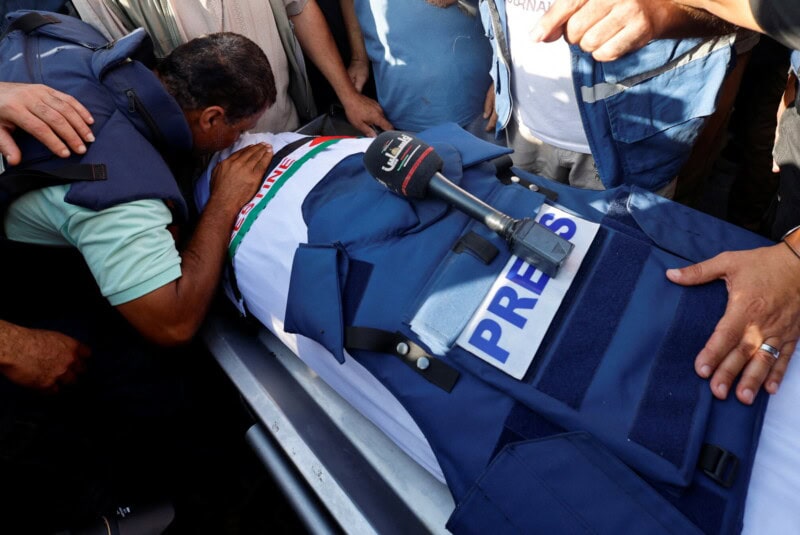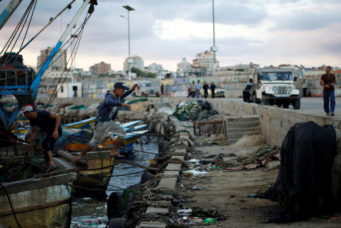Palestinian Journalists as Both Storytellers and Targets in the Israel-Gaza War
For Palestinian journalists confronting physical and psychological threats online and on the ground, the perilous pursuit to document Israel’s war on Gaza embodies a deeper personal mission

In the relentless theatre of war, journalists are more than merely spectators; they form the indispensable eyes and ears on the ground, bearing witness to the most relentless danger and moral complexity. As the Fourth Estate, their role is crucial in ensuring that the public remains informed about the realities unfolding in the thick of conflict zones. However, since the advent of war journalism, reporters have faced physical and psychological threats, often becoming casualties themselves. Data from the Committee to Protect Journalists reveals that between January 1992 and September 2024, over 2,000 journalists globally lost their lives while fulfilling their duties.
Local journalists in conflict zones are both the witnesses and victims, lacking the means to escape the daily threats of their shared reality. UNESCO’s 2020 report on journalist safety highlighted that local journalists remain the primary targets and emphasized their precarious position. Beyond physical threats, these journalists face complex challenges, grappling with the interplay of professional duties, national loyalties, and ethical dilemmas that arise in such high-stakes environments. Journalistic objectivity is tested as they navigate between impartiality and emotional engagement with their communities.
Perhaps nowhere is this more true than in the current Israel-Gaza War, where Palestinian journalists are determined to report events despite suffering the ruthlessness of the conflict. With the international media still largely barred from entering Gaza, they become the world’s main link to the conflict.
These Palestinian journalists do much more than report; their work embodies the very struggle of their people, carved out of personal history, professional dedication, and an unyielding commitment to reporting the events as they unfold. This role comes at an immense personal cost: physical, emotional, and ethical.
Recent research, conducted by three scholars—two from the American University in Cairo and one from the University of Maryland—offers a glimpse into the world of journalists where personal identity, professional responsibility, and the psychological impact of reporting on wars converge. Based on interviews with 18 Palestinian journalists, the study presents significant insights from local journalists who narrate their experiences on the front lines of one of the world’s most dangerous conflicts for the press.
The Perils of War Reporting: A Personal and Professional Battlefield
The dangers of war journalism have long been recognized, but what transpired in Gaza stretched those risks to an extreme. As of February 20, 2025 than 170 Palestinian journalists and media workers—an unprecedented number—have been killed in the war between Israel and Gaza since the violence broke out on October 7, 2023, making it the deadliest conflict on record for journalists and media workers.
This war has brought into sharp focus the physical risks and underlined how precarious Gaza is for journalist safety, consistently ranking in the bottom ten across the World Press Freedom Index.
Despite protections under international law, the grave reality is that nearly one in ten Gaza-based journalists has been killed, underscoring the extreme dangers these local reporters face. While human rights organizations and the United Nations have repeatedly called for the protection of journalists in conflict zones, these appeals often fall short in practice. In February, despite UN officials’ emphasis on deliberate attacks and killings of journalists as war crimes, violence against media workers continued unabated. Many journalists interviewed have fled without protection or safe havens, and those that remain risk their lives daily.
“We are all under fire,” says Wissam Ibrahim, a photojournalist, reflecting on how many journalists remain unshielded even by the so-called protection of press vests and helmets.
Abdullah Obead, affiliated with Palestinian An-Najah (NBC) and Al-Ghad TV, adds that these press shields can sometimes make journalists more of a target, “Sometimes we remove the press shields out of fear for our lives.”
The dangers extend beyond the frontlines. Even the most innocuous tasks, such as filing a story, have become perilous. Journalists often climb buildings in hopes of accessing a better Internet signal, thereby putting themselves at risk of drone attacks.
“We had to go up taller buildings to get a good signal,” says Noor Harazeen, a correspondent for China’s CGTN, “which made us potential targets for drones,” she continued.
Haneen Harara, working with Palestinian Paltoday TV, illustrates another risky method of gaining access by moving closer to the border, likening it to, “throwing yourself into a minefield”.
These risks illustrate how precarious the existence of Palestinian journalists is, their survival and reporting intertwined in one ongoing, harrowing fight.
A Shared Identity: Journalism as a Vocation and National Duty
The journalists’ personal backgrounds often emerge as important factors driving their work. To Palestinian journalists, reporting is not as much a profession but a personal mission born from a shared history of conflict and a deep sense of national duty. Decades of war—from the first Intifada in 1987 to the present—taught them that they have the responsibility to bear witness to their people’s suffering.
“For us as journalists coming from Gaza, it’s more of a duty,” says Youmna El Sayed, who covers the region for Al Jazeera English. “You’re either reporting, or you’re defending your people and your land,” she continued.
This deep connection to their background, heritage and history and professional responsibility underlines the moral weight these journalists carry. Their work is not just to report to the world but to document the untold stories of their homeland, often at colossal personal costs.
The Emotional and Psychological Toll of War Reporting
While the physical dangers in war reporting have been well documented, much less is said about the emotional risks. Gazan-Palestinian journalists work under the shadow of death every moment, but along with that comes the psychological stress of witnessing the horrors of war.
Obead recalls filming the aftermath of an attack: “There were plenty of pictures of human blood, bodies, and martyrs. I [retrieved] a part of a human body eaten by dogs, birds, and even cats in Khan Younis.” These haunting scenes are forever seared into their minds, pushing them to the breaking point of psychological endurance.
This emotional burden is compounded by the constant fear for their families’ safety.
Amir Al-Maghary, a freelance photojournalist, recounts his experience inside Gaza’s Al-Aqsa Hospital: “Every moment I was covering the martyrs and injuries, I was imagining my children and my family. My heart trembled with worry and fear for them because of the indiscriminate Israeli bombing that affected every place and every house in Gaza. I had reached a stage of psychological and physical exhaustion as if I were over 100 years old”.
Harara also poignantly expresses this internal struggle: “The mind is constantly preoccupied with thoughts of family. Are they safe? Are we safe? Will all of us return unharmed? Will I make it back home alive?”
The psychological strain of war reporting, coupled with the fear of losing family members, creates a dual burden that few outside the conflict can fully comprehend. This emotional strain underlines the need for holistic support systems and mental health resources to sustain the well-being of journalists in conflict zones.
Ethical Dilemmas: Balancing Objectivity and Personal Commitment
The war in Gaza presents Palestinian journalists with unique ethical challenges. Being from a community under siege, the balancing act is almost impossible to carry out effectively, given their strong attachment to, and connection with, the conflict.
“Honestly, how can we adhere to neutrality?” asks Obead. “I am Palestinian, but there is an occupier on my land, so neutrality is not applicable in this context.”
This quest for objectivity is further complicated by the moral dilemmas surrounding the reporting of graphic content. Whereas some journalists feel a responsibility to show the stark realities of war, others struggle to protect viewers from trauma.
The study shows how these journalists juggle personal and professional ethics within a conflict zone. As such, it is a delicate balancing act for Basel Alatar, representing Jordan’s AlMamlaka TV: “I try to avoid showing mutilated children’s bodies, and if it’s inevitable, I present them with restraint.” Harara further articulates the challenge of reconciling transparency with sensitivity:
“At times, we refrain from sharing images of blood and children. But how far can we abstain?! Amid witnessing and enduring these circumstances for months on end, the imperative for the world to witness the reality becomes paramount. Beyond honoring the deceased and respecting their families, full transparency in depicting the situation is essential […] In times of war, this flagrant violation of human rights must be meticulously documented.”
This careful navigation between openness and tact in the journalists’ approach illustrates the ethical tightrope they must walk—to inform the world while preserving the dignity of the victims at all costs.
The New Frontier: Online Censorship and Algorithmic Bias
In addition to the physical and emotional risks, one more insidious threat has been happening to Palestinian journalists in the digital world–online censorship. Social media platforms, most notably those under Meta, have become a new battlefield where Palestinian voices are stifled due to algorithmic bias. Algorithmic bias, according to IBM, “occurs when systematic errors in machine learning algorithms produce unfair or discriminatory outcomes”.
Journalists like Harara have struggled with censorship, noting that posts containing terms related to ‘occupation’ or ‘massacre’ receive few views. Reporters have developed creative ways to bypass detection, such as inserting blanks between letters or characters, among other methods.
Yet despite their efforts, they just barely surmount the obstacles posed by algorithmic censorship, which continues to prevent the sharing of lifesaving information.
A Commitment Beyond the Frontlines
Against such overwhelming odds, Palestinian journalists continue to report the news to the best of their ability. If their effort is propelled by an overwhelming sense of duty, then it is not merely to their profession but also a duty to their people.
“We are covering a war that no one had any experience with,” remarks Mohamed Awad, who reports for Saudi Arabia’s Al Arabiya.
“I mean, we are the ones gaining the experience—if we survive, of course.”
This sense of purpose, coupled with their determination that the world should not be oblivious to the stark realities of life in Gaza, ensures that some of the most powerful voices from one of the worst conflicts of our time continue to be heard. This unwavering dedication highlights the perils of war reporting and the critical need for comprehensive support systems to safeguard their well-being.
Through the critical framework of the study, personal identity, professional ethics, and the toll of war shape and mold the work of Palestinian journalists. These journalists navigate a perilous landscape where their roles are not merely about reporting but about bearing witness to the human condition amidst relentless adversity. Their testimony, chiseled by working through conflict complexities is a resilient, courageous, and unflinching stand for truth in a sea of overwhelming adversities.
Their commitment to documenting the realities of their homeland shines as a beacon of perseverance. As they continue to report under extreme conditions, it becomes increasingly clear that their bravery and sacrifice demand our recognition and systemic support. Addressing these journalists’ multifaceted needs— from physical safety to mental health resources—is essential for preserving their invaluable role in bringing global awareness to the suffering and resilience of those caught in conflict. Their work serves as a poignant reminder of the high stakes involved in war journalism and the profound impact that their voices have on shaping our understanding of the world’s most pressing crises.




